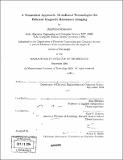| dc.contributor.advisor | Alan Edelman and Gary P. Zientara. | en_US |
| dc.contributor.author | Mitsouras, Dimitrios, 1976- | en_US |
| dc.contributor.other | Massachusetts Institute of Technology. Dept. of Electrical Engineering and Computer Science. | en_US |
| dc.date.accessioned | 2005-09-27T17:54:25Z | |
| dc.date.available | 2005-09-27T17:54:25Z | |
| dc.date.copyright | 2004 | en_US |
| dc.date.issued | 2004 | en_US |
| dc.identifier.uri | http://hdl.handle.net/1721.1/28708 | |
| dc.description | Thesis (Ph. D.)--Massachusetts Institute of Technology, Dept. of Electrical Engineering and Computer Science, 2004. | en_US |
| dc.description | Includes bibliographical references (p. 217-226). | en_US |
| dc.description.abstract | (cont.) independent receiver coils in parallel or time-axis compression, can be cast as complementary to broadband MRI encoding. This affords broadband non-Fourier MRI with time efficiencies over current fast MRI methods. Finally, we describe the first software and hardware implementation combining these mathematical and physical principles in a proof-of-concept practical broadband MRI system, shown to achieve one order of magnitude increase in efficiency for both 2D and 3D MR imaging. | en_US |
| dc.description.abstract | This dissertation investigates the use of matrix compression techniques to increase the efficiency of data acquisition in Magnetic Resonance Imaging (MRI) scanners, such as those routinely used in hospitals. MRI is based on the Nuclear Magnetic Resonance (NMR) principle which states that nuclei with a non-zero spin may only attain specific quantum spin states when under the influence of a magnetic field. By absorbing a photon of energy equal to the difference between two spin states, nuclei are "excited", flipping spins to a higher energy state. Their classical sum, the magnetization vector, once tipped from the lowest energy state, precesses like a spinning top about the direction of the magnetic field. The frequency of its precession depends entirely upon the field's strength. Therefore, just as a camera detects reflected light, including associated color, MRI detects spin density and its associated surrounding chemical conditions via local effects on field strength. MRI, i.e., obtaining an image via localization of the NMR signal, is typically accomplished by manipulating the precession frequency based on location, casting MRI into a Fourier transform problem. In order to increase MRI acquisition efficiency, we follow the proposition of extending the applicability of the physics that MRI is based on. That is, the MR signal content may be prospectively encoded at the excitation step by spatially manipulating both the amplitude and phase of the resonant excitation. In so doing, we create a novel application of algebraic matrix factorization technologies, casting them into broadband MRI signal compression technologies. We examine recent literature to conclude that most fast MRI methods that employ e.g., additional encoding such as multiple | en_US |
| dc.description.statementofresponsibility | by Dimitrios Mitsouras. | en_US |
| dc.format.extent | 226 p. | en_US |
| dc.format.extent | 16960133 bytes | |
| dc.format.extent | 16989386 bytes | |
| dc.format.mimetype | application/pdf | |
| dc.format.mimetype | application/pdf | |
| dc.language.iso | en_US | |
| dc.publisher | Massachusetts Institute of Technology | en_US |
| dc.rights | M.I.T. theses are protected by copyright. They may be viewed from this source for any purpose, but reproduction or distribution in any format is prohibited without written permission. See provided URL for inquiries about permission. | en_US |
| dc.rights.uri | http://dspace.mit.edu/handle/1721.1/7582 | |
| dc.subject | Electrical Engineering and Computer Science. | en_US |
| dc.title | A numerical approach : broadband technologies for efficient Magnetic Resonance Imaging | en_US |
| dc.title.alternative | Broadband technologies for efficient MRI | en_US |
| dc.type | Thesis | en_US |
| dc.description.degree | Ph.D. | en_US |
| dc.contributor.department | Massachusetts Institute of Technology. Department of Electrical Engineering and Computer Science | |
| dc.identifier.oclc | 59550570 | en_US |
